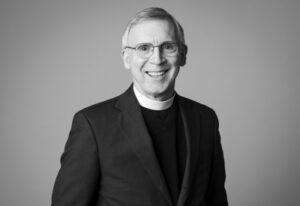 Dear Friends,
Dear Friends,
“Oh, when the saints go marching in. . .”
For those of us of a certain age, it’s impossible to read the opening line of the traditional Black spiritual without hearing the jazz great Louis Armstrong singing it.
This Sunday, November 5, we’ll celebrate All Saints’ Sunday. It’s a way for us to remember that we are part of a large community of people, both living and dead, who form “the communion of saints.” But just who are the saints anyway?
Often when we say the word, “saint,” we mean an official holy person – someone who has been recognized through canonization for holiness. The Roman Catholic Church has a well-established process that must be followed if someone is to be declared a saint. The Episcopal Church has no such official process, although we celebrate and remember “Holy Women” and
“Holy Men” who have had made exemplary contributions to the life and work of the church.
Because people believe that saints are close to God and accessible to us, the saints’ help is often sought for a variety of reasons. For years, Terry drove with a St. Christopher medal pinned to the sun visor of our old Volvo station wagon as a way of invoking Christopher’s protection for our children and her during their travels. And we all know at least one person who has prayed to St. Jude, known as the “patron saint of the impossible.”
Sometimes when we talk about “saints,” we are talking about a person who has died and gone to heaven. It’s helpful to imagine that the veil that separates us from those we “love but see no longer” is a thin one, and that when the congregation joins “with angels and archangels, and with all the company of heaven” in praising God, parents and grandparents, spouses and friends are just on the other side of the communion table from us.
But the way the New Testament speaks of saints has always held the most appeal for me. When St. Paul wrote to the church in Corinth, he addressed his first letter to “those who are sanctified in Christ Jesus, called to be saints…” He was speaking to a group of people whose behavior would never be associated with the way we think saints out to behave. In fact, Paul took members of the Corinthian congregation to task for a variety of bad behaviors – everything from sexual immorality, to infighting, to refusing to share food at the church’s pot-luck suppers following the Holy Eucharist.
However, Paul was on to something when he called the Corinthians “saints.” He understood that being a saint was the result of something God does, not something we do. A “saint” according to Paul, is someone who is “sanctified in Christ Jesus.”
Come join your fellow Trinity saints this Sunday, November 5. Remember to turn your clock back one hour before retiring. And, if you haven’t already done so, bring your 2024 pledge card as we wrap up the Annual Pledge Drive with an ingathering.
I want to be in that number when the saints go marching in. How about you?
Blessings,
Stephen Applegate
